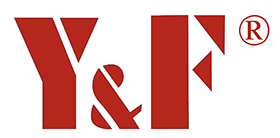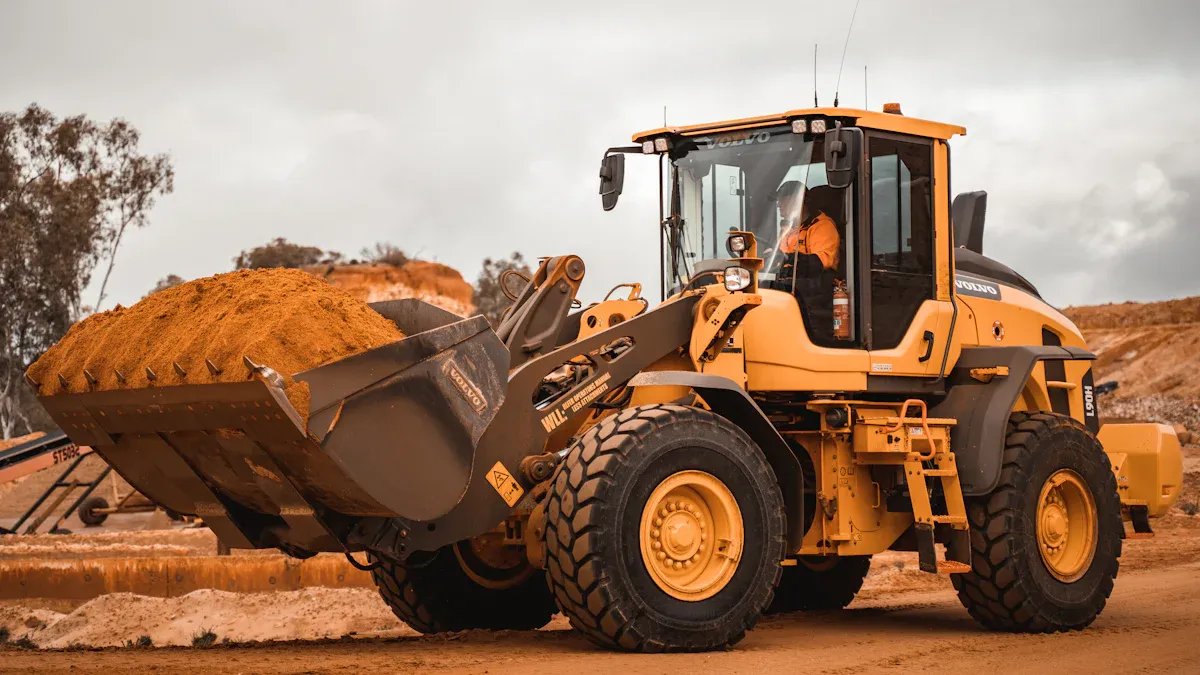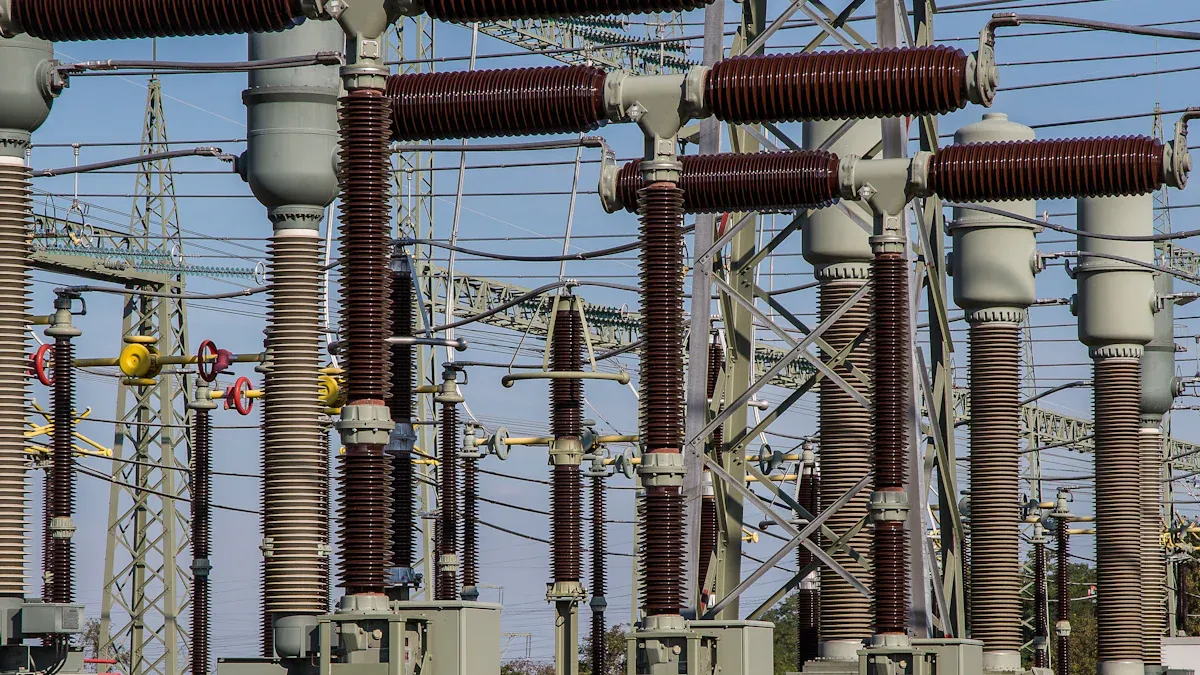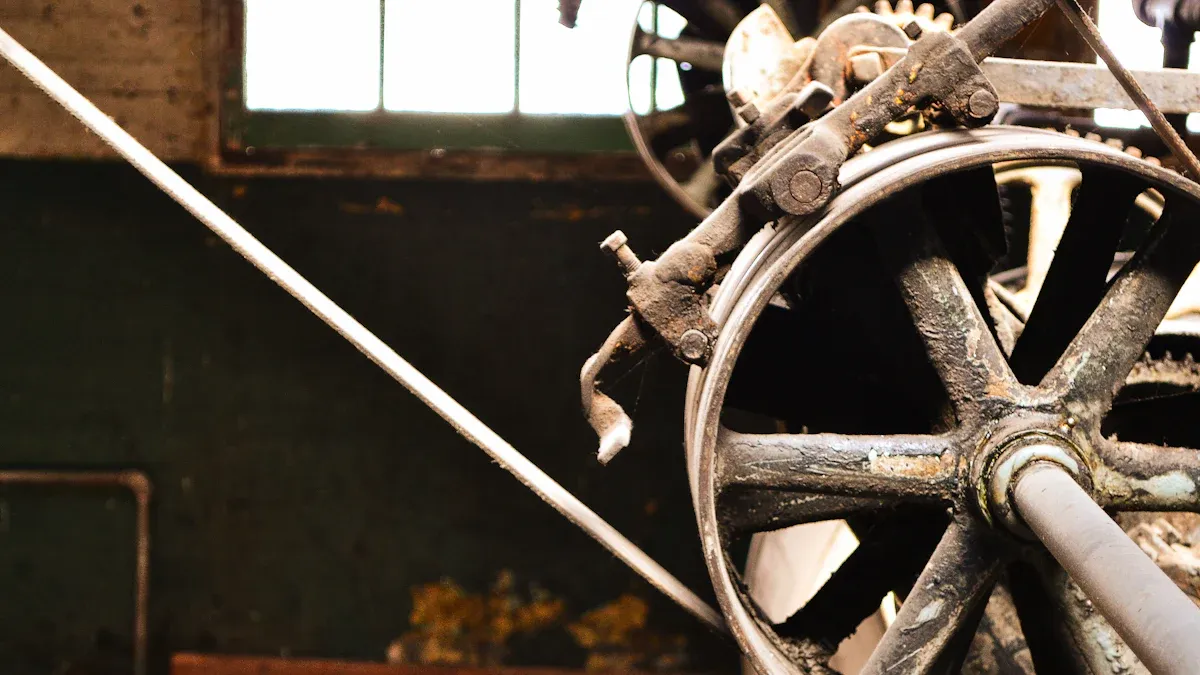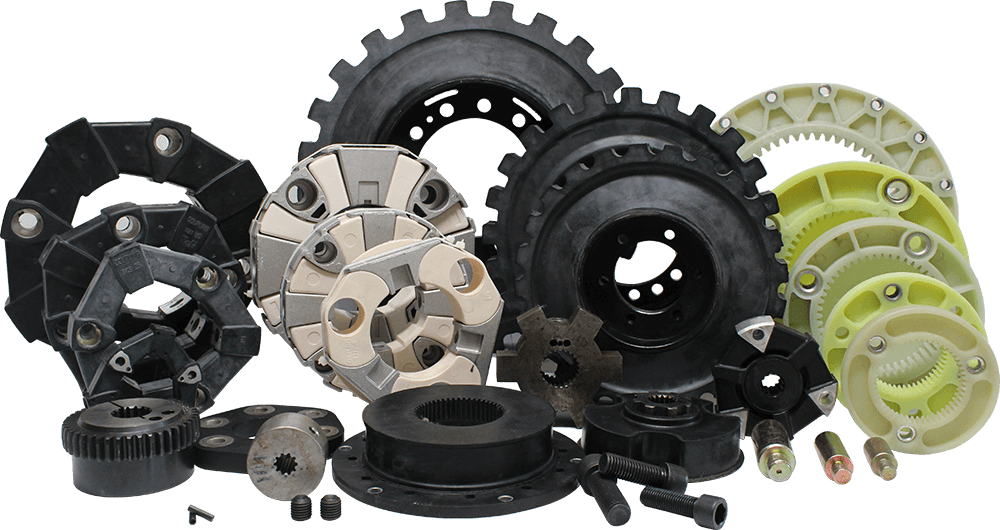
Hydraulic systems need hose coupling integrity to work well. If there are leaks or pressure drops, machines can stop working. This can lead to expensive repairs. Products like YNF Parts’ Flexmaster Hose Coupling help stop these issues.
Feature | How It Helps You Stay Efficient |
|---|---|
Leak-Proof Sealing | Stops fluid from leaking for steady work |
Vibration Absorption | Reduces shaking and makes parts last longer |
Easy Installation | Fast setup helps you keep working |
Corrosion Resistance | Lasts longer, so you fix it less often |
High-Pressure Resistance | Stays safe even when pressure is high |
Key Takeaways
Hose coupling integrity is very important. It stops leaks and keeps hydraulic efficiency high. Checking often can help you avoid expensive repairs.
Pick the correct materials and sizes for hose couplings. This stops leaks and helps your system work well.
Use best practices when you install. Clean the fittings first. Use the right tools. Make sure everything is tight. This stops problems later.
Look at hoses often for wear, leaks, or damage. Finding problems early stops bigger issues. It also keeps your system safe.
Buy good products like YNF Rubber’s Flexmaster Hose Coupling. These seal better and last longer.
Hose Coupling Integrity

What It Means
Hose coupling integrity means your hose connections stay strong and safe. They should not leak. Every hose and fitting must fit together well. There should be no gaps or weak spots. When you put hoses together, measure each part first. Clean the surfaces before you start. Make sure fittings are tight. If you skip these steps, leaks can happen. Your system might fail.
Putting hoses together the right way keeps things working.
You should check for damage and test for leaks often.
Clean and tight fittings help stop dirt from getting in.
Pressure testing checks if your hose can handle high pressure. This test finds weak spots before they break.
You can check hose coupling integrity in different ways. Here is a table that shows some common tests:
Testing Method | Description | Importance |
|---|---|---|
Vacuum Testing | Checks if hoses stay sealed under low pressure. | Makes sure hoses do not collapse and keep fluids in. |
Compatibility Testing | Looks at how hose materials react with fluids. | Stops hoses from breaking down and keeps the system safe. |
Hydrostatic Testing | Puts water pressure in hoses to find leaks. | Checks if hoses are safe and meet rules. |
Visual Inspection | Looks for cracks, leaks, or broken parts. | Finds problems early so you can fix them. |
Pressure Testing | Makes sure hoses can handle working pressure. | Finds weak spots and keeps hoses safe. |
Burst Testing | Tests how much pressure hoses can take before breaking. | Sets safety limits and follows the rules. |
Why It Matters
You need hose coupling integrity for safe hydraulic systems. If couplings break, leaks and pressure loss can happen. Your equipment might get damaged. These problems can stop your machines. Repairs can cost a lot.
Here are some reasons hose coupling integrity is important:
Hoses must handle the right pressure for your system.
Hot or cold temperatures can make hoses weaker.
Using the right materials stops hoses from getting damaged.
Each machine needs the correct hose and coupling.
Industry standards help you trust your hose couplings. These rules make sure hoses work under high pressure. They last longer and fit your machines. You get better safety and performance.
Aspect | Impact on Reliability |
|---|---|
Safety | Hoses can handle high pressure and protect equipment. |
Performance | Hoses are tested to make sure they work well. |
Compatibility | Standard sizes help hoses fit many machines. |
Longevity | Following rules helps hoses last longer and break less. |
Bad hose coupling integrity can happen for many reasons. These include rubbing, bad hose paths, high heat, tube wear, fitting problems, wrong fluids, and bad assembly. Watch for these problems to keep your system safe.
When you buy good hose couplings, your system works better. You have less downtime and protect your machines and workers. YNF Rubber gives you strong hose couplings for every job.
Impacts of Poor Integrity

Leaks and Pressure Loss
If you do not check hose coupling integrity, leaks can start quickly. Even a tiny leak, like one drop each second, wastes 420 gallons of hydraulic fluid in a year. This means you spend more on new fluid and cleaning up. Leaks also make your system lose pressure. Pumps have to work harder to keep things running. This uses more energy and costs more money. You might see more breakdowns and need more repairs.
Consequence | Description |
|---|---|
Higher Power Requirements | Pumps work harder when pressure drops, so energy use and costs go up. |
Maintenance and Downtime | Systems that work too hard break down more, so you pay more for repairs and lose time. |
Component Stress and Failure | Too much pressure can break parts early, which can stop your system. |
Safety Hazards | Bad pressure control can be dangerous, especially when machines lift heavy things. |
Leaks do more than waste fluid. They can make soil and water dirty. Spilled hydraulic fluid hurts plants, animals, and people. Pollution can also mean fines and hurt your company’s name.
Environmental Impact | Description |
|---|---|
Soil and Water Contamination | Leaking hydraulic fluids can get into dirt and water, which can hurt plants, animals, and people. |
Pollution | Spills and leaks cause pollution, which can mean fines and hurt your company’s reputation. Pollution can also harm local nature and towns. |
Equipment Damage
Bad hose coupling integrity can break your machines. When pressure drops, pumps and motors must work harder. This can make parts break sooner. You might need to buy new fittings, hoses, or even whole machines. A small $25 fitting can cause hundreds of dollars in damage if it breaks other parts. If your machine stops, you lose money every hour. In forestry, stopping work can cost $1,200 each hour. Four hours of repairs can mean $4,800 lost. Emergency repairs cost more, especially if you need extra workers or rent machines.
You can lose thousands of dollars while waiting for repairs.
Emergency workers cost more when you need fast help.
Buying new parts adds up, even if the first fix is cheap.
Renting machines to keep working can cost over $1,200 each day.
Safety and Downtime
Not caring about hose coupling integrity can put you and your team in danger. High-pressure leaks can shoot fluid into the skin and cause bad injuries. These injuries can be very serious. Burst hoses can break machines and make you lose control. Hydraulic leaks make floors slippery and can start fires if the fluid burns. Leaks also hurt the environment and can cause infections or bad wounds.
Hose bursts can stop your system and cost a lot to fix.
Fluid injection injuries can happen from tiny leaks or bursts.
Leaks make floors slippery and can start fires.
Leaks can pollute the environment.
High-pressure failures can cause bad injuries and infections.
To stop these problems, buy from good suppliers like YNF Rubber. Good hose coupling integrity keeps your machines, your team, and the environment safe.
Maintaining Integrity
Selection and Sizing
Picking the right hose coupling is very important. It helps keep your hydraulic system safe and working well. You need to match the coupling material with your hydraulic fluid and where you use it. Steel, aluminum, and stainless steel couplings are good for different jobs. Always check the pressure rating before you choose. Pick couplings that can handle your system’s highest pressure. Make sure the size fits your hose and equipment. If you use the wrong size, leaks can start. Fluid flow slows down, and your system works harder. This can make it overheat and break.
YNF Parts’ Flexmaster Hose Coupling gives you many choices. You can pick the right material and size for your machine. Leak-proof sealing and vibration absorption help your system last longer.
Tip: Always check if your couplings meet industry standards like SAE, EN, or ISO. This helps you stay safe and keeps your system working well.
Key criteria for selecting hose couplings:
Material compatibility with fluid and environment
Pressure ratings that match your system
Correct sizing for hoses and fittings
Compliance with industry standards
If your hose is too small, your bulldozer arm may move slowly. It can also get too hot. A narrow hose can block fluid and make your machine less efficient. This can cost you more money.
Installation Best Practices
Good installation stops leaks and keeps your system strong. Use the right tools, like torque wrenches and hydraulic crimping machines. Clean all fittings before you start. Check threads for any damage. Tighten couplings to the manufacturer’s recommended torque. Do not overtighten, especially with softer materials. Follow crimping steps for secure fittings.
Route hoses so they do not bend sharply or kink. Use clamps or supports to hold hoses in place. Make sure hoses are not twisted. This helps stop wear and tear. Put thread sealant or Teflon tape on threaded connections for better sealing.
YNF Parts’ Flexmaster Hose Coupling is easy to install. The design helps you set up fast and make fewer mistakes. Leak-proof sealing keeps your system safe from air leaks.
Best practices for installation:
Use proper tools for tightening and crimping
Clean and inspect all fittings before assembly
Apply correct torque to avoid leaks
Route hoses to avoid sharp bends and kinks
Support hoses to minimize movement
Use sealants on threaded connections
Inspection and Maintenance
Checking and taking care of your hoses keeps them strong. You should check hoses often. For busy systems, check every week. For most jobs, check every month. If you use hoses less, check every few months. If your system is high-risk, check every day.
Look for oil stains or wet spots around fittings. These can mean leaks. Watch for slow operation or overheating. These signs may show hose damage inside. Make a routine to check hoses, especially at bends and connections. Protect hoses from rubbing on rough surfaces. Keep system pressure safe. Secure hoses so they do not move too much.
Maintenance Procedure | Description |
|---|---|
Regular Inspections | Check hoses every few months for leaks and issues. |
Look for Signs of Leakage | Watch for oil stains or wetness around fittings. |
Monitor System Performance | Notice slow operation or overheating. |
Proactive Inspection Program | Examine hoses visually, focusing on bends and connections. |
Follow instructions and best practices for installation. | |
Guard Against Abrasion | Protect hoses from rough surfaces. |
Maintain Optimal Pressure | Keep system pressure within safe limits. |
Minimize Hose Movement | Secure hoses to prevent flexing during use. |
Note: Training your workers helps stop hose failures. Companies that train their teams have fewer breakdowns and less downtime. More inspections mean your system stays safe.
Common Mistakes
Problems happen when you skip steps or rush. If you do not check hoses before installing, leaks or failures can happen. Picking the wrong material can cause corrosion or leaks. If you get the hose length wrong, hoses may stretch or kink. Ignoring pressure ratings can cause dangerous leaks. Bad joint choices and poor routing make hoses wear out faster. If you do not test the system after installing, you may miss hidden problems.
Some people forget to clean parts before putting them together. This can let dirt in and cause damage. Twisted or misaligned hoses create stress points and leaks. Over-tightening or under-tightening fittings causes damage or leaks. Always make sure all parts are tight and secure.
Common mistakes to avoid:
Skipping pre-installation inspection
Choosing the wrong material
Miscalculating hose length
Ignoring pressure ratings
Poor joint and fitting choices
Improper routing and securing
Failing to test after installation
Over-tightening or under-tightening fittings
Improper assembly
Remember: Using high-quality products like YNF Parts’ Flexmaster Hose Coupling and following best practices helps you avoid these mistakes. You protect your equipment and keep your hydraulic system running smoothly.
Maximizing Efficiency
Real-World Examples
You can see the value of strong hose coupling integrity in many real jobs. When a mining company used a hydraulic drilling rig, they faced high pressure and strong vibrations. They upgraded to high-performance couplings. This change made their system safer and more efficient. Downtime dropped, and the team finished more work each day.
Another example comes from a team using hydraulic thumbs on heavy equipment. They had problems with snapped lines and safety risks. By switching to a 45° adapter with heavy-duty quick couplers, they stopped the lines from snapping. This upgrade made the system safer and kept dirt out. The machines ran better and needed fewer repairs.
These real-world cases show that the right couplings can boost safety, cut downtime, and improve how your machines work.
Maintenance Checklist
You can keep your hydraulic system running well by following a simple checklist. Regular checks help you spot problems early and avoid big repairs.
Item | Description |
|---|---|
Leaks and Frays | Look for leaks or frayed hoses that can cause bigger issues. |
Pipes and Connections | Check for ballooning, kinks, or damage in hoses and connections. |
Fittings and Couplers | Make sure fittings are not rusty, too loose, or too tight. |
Here is a step-by-step list you can use:
Look for cracks or leaks on all hoses.
Check for fluid leaks around fittings.
Feel hoses for bulges or swelling.
Inspect hose ends for fraying.
Bend hoses gently to test flexibility.
Make sure all fittings are tight and secure.
Tip: Regular inspections and using high-quality couplings from YNF Rubber help you avoid costly breakdowns and keep your system safe.
You can make your hydraulic system work better by checking hose coupling integrity. Keeping the pressure steady helps you use less energy. This also makes your machines last longer. If you look at your hoses often and install them the right way, you can stop leaks and big problems. Good products like Flexmaster Hose Coupling from YNF Rubber help keep things safe and working well.
Keeping pressure steady helps your system work better and saves energy
Checking hoses before problems happen means less downtime and keeps your team safe
Always remember to care about hose coupling integrity in every hydraulic system.
FAQ
What does hose coupling integrity mean for hydraulic systems?
Hose coupling integrity means your hose connections stay strong and do not leak. You keep your system safe and working well when you use the right couplings and check them often.
How often should you inspect hose couplings?
You should inspect hose couplings every month for most jobs. If your system works hard or in tough conditions, check every week. Regular checks help you find problems early.
Why should you choose YNF Rubber’s Flexmaster Hose Coupling?
YNF Rubber’s Flexmaster Hose Coupling gives you leak-proof sealing and vibration resistance. You get easy installation and strong materials. These features help your hydraulic system last longer and work better.
What signs show a hose coupling needs replacement?
Look for leaks, cracks, bulges, or frayed ends. If you see rust or loose fittings, replace the coupling. Quick action keeps your system safe and prevents bigger problems.
Can you install hose couplings without special tools?
You can install some couplings by hand, but using the right tools helps you get a tight fit. Tools like torque wrenches and crimping machines make installation safer and more reliable.
